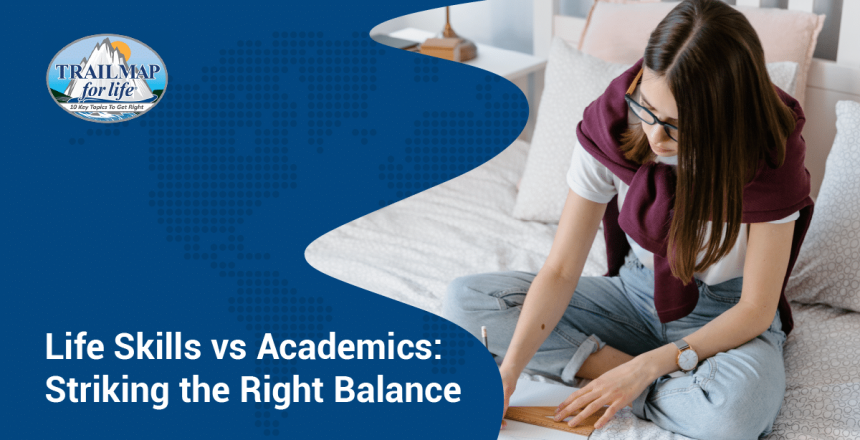Introduction
The importance of education in achieving success is widely acknowledged. However, does education solely revolve around academics, or are there other vital skills to consider?
The ongoing debate between life skills and academics has left many wondering, and there is no one-size-fits-all solution.
Maybe you have looked at some life skill examples and are considering if academics are more important to learn.
In this article, we will explore this intense debate and examine how to strike a balance between academics and life skills.
The Value of Academics
Academics play a crucial role in shaping our lives and future.
They offer us a foundation of knowledge that can be applied in many areas of life, from personal growth to career success.
Below are three reasons why academics are valuable:
Building a Strong Foundation of Knowledge
Academics help us establish a strong foundation of knowledge in various fields, including math, science, literature, and history.
This knowledge provides us with a better understanding of the world around us, enabling us to make informed decisions.
It also helps us develop critical thinking and problem-solving skills that can be applied in various situations.
Career Advancement
Academics can also be a significant factor in career advancement.
Many jobs require specific academic qualifications or degrees, and having these credentials can open up more job opportunities and higher salaries.
Moreover, academic achievements such as scholarships, awards, and high grades can make a positive impression on potential employers and increase the chances of landing a job.
Personal Development
Academics can also contribute to personal development.
Learning new things, acquiring knowledge and skills, and achieving academic goals can boost self-esteem, confidence, and motivation.
Academic pursuits can also enhance our creativity, imagination, and curiosity, leading to personal growth and a broader perspective on life.
What Are Life Skills?
Life skills are a set of practical abilities and knowledge that are essential for success in the real world.
They encompass a wide range of skills, from communication and problem-solving to decision-making, time management, and emotional intelligence.
Unlike academic knowledge, they are not typically taught in a classroom setting but are learned through experience and practice.
They enable you to navigate daily challenges and achieve your goals, whether in personal relationships, career choices, or other areas of life.
The Importance of Life Skills
Life skills are critical for success in the real world. They help you navigate various challenges, from personal relationships to career choices.
It enables you to communicate effectively, manage your time efficiently, and make informed decisions.
They also foster emotional intelligence, which is essential for self-awareness, self-regulation, motivation, empathy, and social skills.
Learning Life Skills
Although life skills are not traditionally taught in an academic setting, there are ways to learn and develop these skills.
Opportunities to practice and observe life skills can be found through activities such as volunteering, traveling, or participating in extracurricular activities.
Courses and programs designed to teach life skills, such as money, marriage, faith, friends, and character, can help you develop them.
In fact we have a free program for families that teach you the top 10 life skills!

Importance of Balancing Life Skills and Academics
While both life skills and academics are important, it is essential to find a balance between the two.
Here are three reasons why balancing life skills and academics is crucial.
Personal Development
Balancing life skills and academics can lead to personal development.
While academics provide a foundation of knowledge in specific fields, life skills are essential for personal and professional success.
Development of communication, problem-solving, and emotional intelligence can help you build relationships, make informed decisions, and manage your time effectively.
Balancing these can help you achieve personal growth and fulfillment.
Professional Success
While academics provide a foundation of knowledge in specific fields, life skills are essential for career development.
Employers look for candidates with practical skills such as communication, problem-solving, and teamwork.
Balancing life skills and academics can help you develop these skills and increase your chances of success in the job market.
Well-being
Finally, balancing life skills and academics is essential for overall well-being. Focusing only on academics can lead to burnout and stress.
Developing life skills such as time management, self-care, and emotional intelligence can help you manage your stress and maintain a healthy work-life balance.
Balancing these can lead to greater well-being and overall happiness.

Strategies for Success
Developing life skills and academics is a process that requires ongoing dedication and effort. To achieve success in both areas, you can employ a variety of strategies.
Here are three effective ways to develop both life skills and academics:
Experiential Learning
Experiential learning offers a powerful way to develop both.
This type of learning involves engaging in real-world experiences that allow you to apply academic knowledge to practical situations.
Examples of experiential learning include internships, volunteering, and travel.
As you move through life you will learn in both areas in different ways. You will grow as a person without even realizing it.
Mentoring and Coaching
Mentoring and coaching are also valuable tools for developing life skills and academics.
Mentors and coaches can provide guidance, feedback, and support as you navigate your academic and personal journeys.
They can help you identify your strengths and weaknesses, set goals, and develop strategies for achieving those goals.
Good mentors and coaches can be anyone in your life who you trust and respect in the given area you want to learn.
If they have a strong foundation and are successful in the area, it can help your personal growth.
Self-Directed Learning
Self-directed learning is the most powerful of the 3 because you are being intentional and learning as you go. This type of learning involves taking responsibility for one’s own learning and development.
It requires you to set goals, identify resources, and create a plan for achieving those goals.
Self-directed learning allows you to develop autonomy, self-motivation, and critical thinking skills, which are essential for both academic and personal success.
Conclusion
In conclusion, developing life skills and academics is a continuous process that requires a combination of experiential learning, mentoring and coaching, and self-directed learning.
By developing both, you can achieve personal growth, professional success, and overall well-being.






